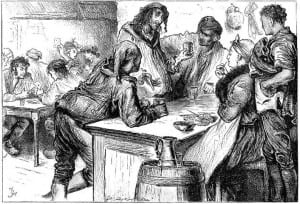Recently I had the opportunity to sit-in on a lecture of Dr. Rebecca Nesvet’s for her class “The English Novel: 1850’s to the Present.” The reason why this lecture was particularly interesting was because it covered the topic of binary knitting, or knitting code – an idea of two very different disciplines fusing together. Professor Alison Gates, Chair of the Arts program and well-versed in the world of textiles, assisted in the lecture by discussing her knowledge about different types of knitting around the world and the commonalities between knitting and writing codes. A way that this can be done is by simply using a pattern between knitting and purling.
We have all heard a variation of the phrase “Knit one, purl two.” When it comes to knitting a code, it isn’t very different than using a pattern of ones and zeroes as we would for computer coding. Even more interesting that this strategy was discovered long before the first computer. How this ties together with Dr. Nesvet’s English Novels class is in the interest of Madame Defarge in Charles Dickens’ A Tale of Two Cities. Madame Defarge was introduced as the wife of a shopkeeper, knitting in the corner, as that was a common activity for women of that time period to be doing. What was not immediately prevelant, however, was the fact that she was knitting code. As if the idea of an old woman knitting a secret cipher was not interesting enough, the message that she was knitting was what we would, by today’s standards, call a hit list.
The interest revolving around this topic has not been limited to just Dr. Nesvet’s class; here are some additional sources to look at:
Madam Defarges Cypher – Montgomery Bell
Steganographic Knitting – Sky Fish Knits
